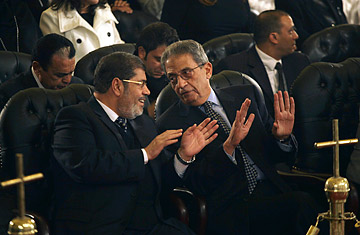
Mohamed Morsi, left, of Egypt's Muslim Brotherhood and Egyptian presidential hopeful Amr Moussa, right, talk before Christmas Eve mass, led by Coptic Pope Shenouda III at the Coptic cathedral in Cairo, Egypt, Jan. 6, 2012.
(2 of 2)
Brotherhood officials have also reached out to American and European diplomatic partners in recent weeks, and have assured both constituents and international partners of their commitment to moderate and inclusive policies in the months ahead. Over the weekend, Brotherhood leaders attended the Coptic Christmas mass at Cairo's main church in a gesture to the country's increasingly wary Christian minority, even as Salafi groups lambasted Christmas celebrations as haram — or un-Islamic. "My sense is that the Brothers feel like the Salafis are politically immature," says Stacher, who notes that the two Islamist blocs also have very different visions of an Islamic Egypt. And the Brotherhood, which as an organization is better acquainted with regime heavy-handedness than the rookie Salafi parties, also knows the military still has the upper hand when it comes to arms and resources. "The Brothers have never really gone for broke, and they're not going to go for broke now," Stacher says. "Now that the Muslim Brotherhood has had their little taste of freedom they're not going back to prison."
Still, the fast rise of the Brotherhood to political prominence doesn't necessarily write the smaller players out of the scene; it merely marginalizes them. Stacher predicts that violent confrontations between the military and liberals or other groups — like the security crackdowns on protesters in Tahrir Square that have left more than 80 people dead since October — will continue in 2012. "Now that the Muslim Brotherhood and the Salafis both have seats, SCAF will try to use them against non-Islamist groups. They can kind of favor the Islamists to get the secularists all worked up," he says. "Or they can play the groups off one another."
Abdallah, the Salafi scholar, says the liberals' influence is on the wane. "Now we are going to control the country," he says. "America will support the liberals with money for a long time, but by the end, they'll be the second Karzai," he adds, comparing their inevitable decline to that of the U.S.-backed president of Afghanistan.
Abdallah's confident rhetoric also raises the specter of the Salafi wild card. Namely, what happens if the most extreme members of parliament find themselves sidelined, either by a Brotherhood seeking a more moderate politics, or by a military that slows — or even derails — their quest for pure Islamic law? (Shari'a law is already a basis of the current Egyptian constitution.)
Some Egyptians report that in Egypt's post-Mubarak security vaccuum, some Salafi groups have already started taking matters of Islamic jurisprudence into their own hands. Rumors abound about Salafis enforcing their interpretation of Shari'a on public spaces. In one Alexandria school, Salafis reportedly ordered the segregation of boys and girls; and a Cairo-based blog reported a Salafi attempt to shut down a women's beauty parlor in the Nile Delta. "I am not against living in a country with a religious background," says Marco Safa, a Christian university student in Cairo. "But they have to remember that they are not alone here. They need to respect the rest of the people, and private freedoms should be guaranteed."
A facebook group supporting the "Committee for the Promotion of Virtue and Prevention of Vice" — the shadowy organization that some Egyptians allege is behind the recent incidents, and which claims a connection to the Salafis' Nour Party — proposes nothing in matters of parliamentary legislation. Rather, it advises its thousands of facebook fans to "save the Shari'a of God in his lands, and to work according to what he has sent us in his beloved book."
Indeed, Abdallah says the ultra-Islamists, if sidelined, won't need to push legislation anyway; the people will enforce Islamist decrees on their own. "The Egyptians are not satisfied with living with wine in their streets," he says. "And the people, not Islamists [in parliament], are the ones who will stop this in the streets," he adds. "We just started in parliament. So give the sword to the people."
With reporting by Sharaf Al-Hourani/Cairo
